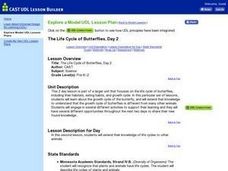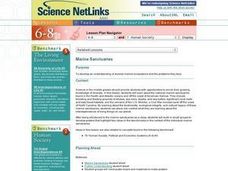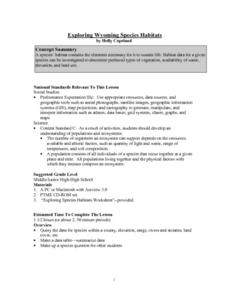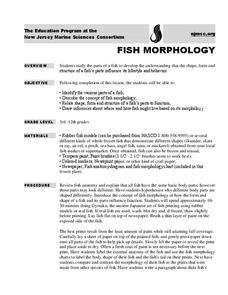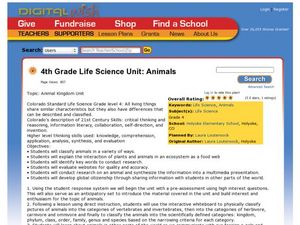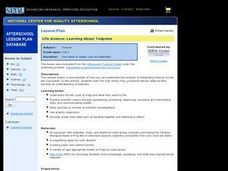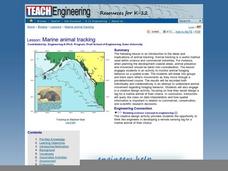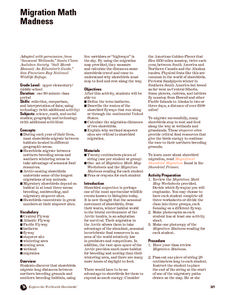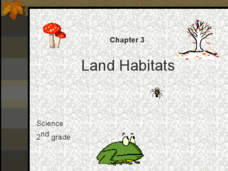Curated OER
Adaptations to Niches and Habitats
Life science learners measure and record traits of seeds, leaves, and their own hands and then graph the data to find a continous distribution curve. They compare and color diagrams of seven different animals' forelimbs (not included),...
Curated OER
The Life Cycle of Butterflies, Day 2
Second graders extend their knowledge of life cycles to other animals. They demonstrate their understanding that at the beginning of an animal's life cycle, some young animals represent the adult while others do not. They will...
Curated OER
Life in the Crystal Palace
Marine biologists research sea ice communities. Assign some groups to construct paper models of sea ice communities in winter, and some to construct models of them in summer. The lesson is simplistic, but the Internet resources provided...
NOAA
A Day in the Life of an Ocean Explorer
What's life like aboard an ocean exploration vessel? Junior oceanographers examine the important role of communication in ocean research in lesson plan two of a five-part series from NOAA. The materials introduce the class to life on...
National Wildlife Federation
Butterfly Life Cycle
Caterpillars and butterflies each have their own unique challenges. While studying the life cycle of butterflies, learners focus on the threats to each stage. While some threats will be the same, each stage has its own unique challenge.
NOAA
It's a Roughy Life
Scientists recently discovered several previously unknown species at the Bear Seamount off the coast of New England. Scholars research these new species — benthopelagic, benthic, and seamount fish — and find out what makes them unique....
Curated OER
Marine Sanctuaries
Learners delve into diverse marine ecosystems and the problems they face. They discover students the national marine sanctuaries found in the Pacific and Atlantic oceans and off the coast of American Samoa.
National Wildlife Federation
Massive Migrations
Turn your students into flocks of migratory birds for this fun lesson on animal migration. Prior to the activity, the teacher creates four different migration routes in the classroom or any available open space, labeling nesting...
Curated OER
The Life Cycle of a Butterfly
A well-designed lesson on the life cycle of the butterfly is here for you. In it, young scientists spend 45 minutes a day, for one school week, engaged in their study. They take nature walks, participate in activities in centers, listen...
Curated OER
The Life Cycle of Butterflies, Day 1
Describe each stage in the life cycle of a butterfly. Second graders will identify the stages of the life cycle of the butterfly, using correct vocabulary. They will also share their new understandings about the stages of the life cycle...
Curated OER
Urban Life: What Lives In Our Local Park?
Fifth graders participate in activities during a visit to Central Park. In this urban life lesson, 5th graders visit Central Park where they explore pond dipping, stream chemistry, and play a native plant Bingo game.
Curated OER
Pond Life
Young scholars recognize the habitats of animals that live near or in a pond. In this pond lesson, students examine pond water and look for pond organisms. Young scholars observe organisms with a loupe and complete a worksheet.
Aquarium of the Pacific
Kelp Forest Habitat
What forest is in the ocean? The class watches a video that introduces the kelp forest and the parts of kelp. Learners dive into the ocean and see what different species live near the canopy, the midwater, and the bottom of the kelp...
NOAA
Deep-Sea Ecosystems – Life is Weird!
A pool of brine in the deep sea can be up to four times as salty as the surrounding sea water. The deep sea ecosystem relies on chemosynthesis and the organisms that live there are often strange to us. The lesson focuses on researching...
Curated OER
Exploring Wyoming Species Habitats
Students are introduced to the concept of species habitats and ranges. They introduced to ArcView GIS as a tool for mapping. Pupils use query data for species withina county, elevation, range, rivers and streams, land cover, and etc....
Curated OER
Butterfly 1: Observing the Life Cycle of a Butterfly
Students observe and identify the characteristics of the life cycle of a butterfly.
Consortium for Ocean Science Exploration and Engagement (COSEE)
Fish Morphology
Life comes in all different shapes and sizes, and fish are no exception. Here, young scientists create fish prints as they learn how specific characteristics allow different species to survive in their particular habitats.
Curated OER
Ocean Habitats
Students examine the water samples from a demonstration and discuss the difference between fresh and salt water. They draw different animals that live near or in the ocean and how humans can harm the ocean habitat. They draw pictures of...
Curated OER
4th Grade Life Science Unit: Animals
Fourth graders classify animals. In this animal kingdom lesson, 4th graders research animal habitats and behaviors. Students connect to a zoologist via SKYPE and learn about animal classification. Students blog about preserving animal...
Curated OER
Life Science- Learning About Tadpoles
Students investigate a frog's life cycle. In this tadpole lesson, students observe tadpoles in an aquarium and record results. Students fill in a KWL chart as an assessment.
Curated OER
Marine Animal Tracking
Students engage in a lesson which serves as an introduction to the ideas and implications of animal tracking. They monitor animal foraging behavior on a spatial scale. The students break into groups and track each other's movements as...
Prince William Network
Migration Math Madness
A great way to incorporate math into life science, this lesson has learners measure migratory routes on a map and calculate the actual distance that shorebirds on the routes would cover. Learners compute the distance covered in both...
Alabama Wildlife Federation
Life in a Pond
What living things call an aquatic habitat home? Young learners consider the question after they discuss the characteristics of a typical pond habitat. They identify an animal and then determine if a pond would have all the components to...
Curated OER
Land Habitats: Grade 3 Science
Build your students scientific vocabulary with this slide show on land habitats. Each slide provides a vocabulary word, image, and definition of a term common to habitats and the environment. Great for science class or as comprehensible...



